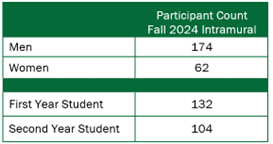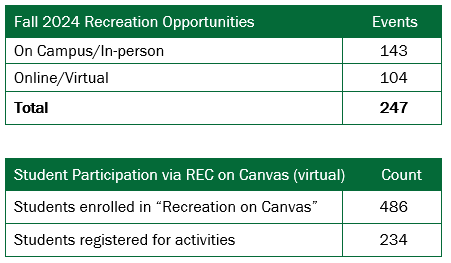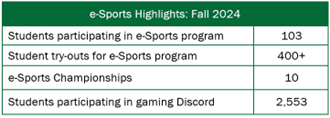StudentAffairs@NOVA
Campus Recreation: Engaging students, supporting success and building community
Student success isn’t just about what happens in the classroom—it’s also about creating an environment where students feel connected, supported and engaged. Campus Recreation plays a critical role in this effort, offering opportunities for students to build friendships, stay active and develop essential life skills that contribute to their academic and personal success.
With a broad range of activities—from intramural sports and fitness programs to e-sports and wellness initiatives—Campus Recreation is a proven engagement strategy that helps students feel a greater sense of belonging, improves well-being and fosters leadership and teamwork.
Why Campus Recreation Matters for Student Success
Engagement outside of the classroom is a key factor in student retention and achievement. Recreation programs are designed to:
- Cultivate Personal Growth – Students develop leadership, teamwork and problem-solving skills.
- Enhance Academic Performance – Recreation reduces stress, boosts focus and improves time management.
- Support Health and Well-Being – Physical activity is linked to better mental and emotional resilience.
- Shape a Stronger Sense of Community – Students who feel connected to campus are more likely to persist and succeed.
Faculty and staff play a vital role in encouraging students to participate. A simple conversation about recreation opportunities or directing a student to the right resources can make a big difference in their engagement and well-being. Campus Recreation: By the Numbers
NOVA Recreation has expanded allowing more students to participate across a variety of activities, including:
- Intramural Sports: Basketball, Soccer, Volleyball, Kickball, Flag Football, Ultimate Frisbee

- Casual & Competitive Games: Pickleball, Cornhole, Badminton, Spikeball, Table Tennis
- Fitness & Wellness: Group fitness sessions, “Soulful Stretch” mindfulness programs, Wellness Webinars

- Esports: One of the fastest-growing programs, bringing students together through digital competition

Expansion of recreational services for students has generated high interest in both intramural and recreational events. Students are actively engaging and participating in our general activities as showcased below:

Campus Highlights
- Annandale and Loudoun lead in intramural participation, with soccer, basketball, and volleyball as the most popular sports.
- Esports growth has been significant, particularly in Alexandria and Woodbridge, where students are forming competitive teams.
- Medical Education Campus is expanding wellness-based activities such as fitness challenges, stress-relief events, and interactive games like Trashketball.
The Expanding Role of Esports
Esports has quickly become one of the most effective ways to engage students, particularly those who may not participate in traditional athletics. With low barriers to entry and a strong social component, competitive gaming has created a space where students can connect, collaborate and develop valuable skills in a way that feels both accessible and inclusive.
For many students, esports is more than just a recreational activity—it’s a community where they find confidence and belonging. The structured yet flexible nature of competitive gaming provides an opportunity for students to engage in teamwork, practice strategic thinking and hone problem-solving skills in real-time. These are the same critical skills that translate into academic success and future career readiness.
Esports is also breaking down barriers, attracting students from diverse backgrounds and including those from underrepresented groups. By providing an alternative to traditional athletics, esports ensures that more students can experience the benefits of competition, collaboration and campus engagement.
To continue growing esports participation, NOVA is expanding opportunities through collaborative events with student organizations and academic departments, offering beginner-friendly gaming nights to welcome new players, and empowering student leaders to promote recreation through peer advocacy. These efforts ensure that more students can experience the benefits of teamwork, competition and community—both on and off the screen.
How Faculty and Staff Can Help
Campus Recreation is a valuable tool in student success efforts, and faculty and staff are key partners in making students aware of these opportunities.
Here’s how to help:
- Encourage students to get involved – A quick mention of intramurals, fitness classes or esports could spark interest.
- Refer students who need support – Physical activity and recreation can be beneficial for students struggling with stress or engagement.
- Collaborate with Campus Recreation – Explore ways to integrate wellness and recreation into academic or student success initiatives.
Campus Recreation is a vital part of supporting student engagement and success. Together, we can go boldly and help students thrive!
If you have any questions regarding Campus Recreation, please reach out to Cecil “CJ” Jackson, Associate Director of College Recreation, at Cecijackson@nvcc.edu
Student Affairs Leadership looks forward to continuing to share and present to the NOVA community what Student Affairs is accomplishing @NOVA every second Tuesday of the month.
—Dr. Joel Frater, vice president of student affairs
